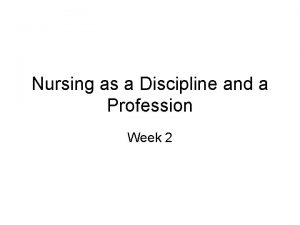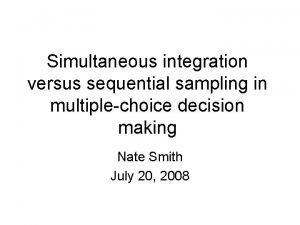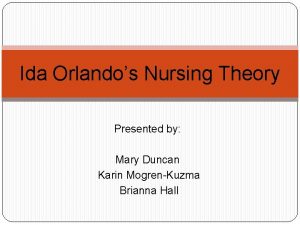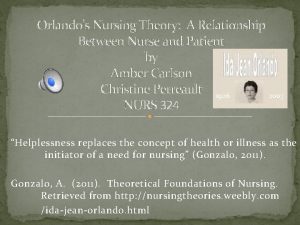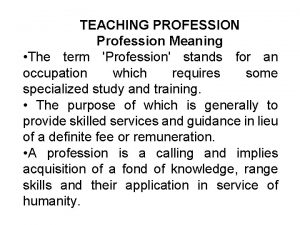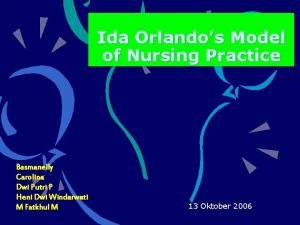Orlandos Nursing Theory Integration into Nursing Profession Carrie








- Slides: 8

Orlando’s Nursing Theory: Integration into Nursing Profession Carrie Hallihan Randi Sniegowski Steve Rich NURS 324 – Transition into Professional Nursing

Introduction to Orlando’s Nursing Theory • Ida Orlando was an early nursing theorist who posed this question towards her patients, “How can I best figure out what my patient needs are through my interaction with him or her” (Black, 2014, p. 276). • Her theory touched on many aspects of the nursing profession: • Evidence based practice • Metaparadigm concepts of nursing, environment, health, and person • Improving the contemporary health care setting today

Orlando’s Nursing Theory: Evidence Based Practice • “Theory-guided, evidence based practice is the hallmark of any professional discipline” (Nursing Theories, 2012). Orlando’s nursing theory is a prime example. • “When used in practice, Orlando’s theory guides interactions to predictable outcomes, which are different from outcomes that occur when theory is not used” (Black, 2013 p. 277). • Orlando’s theory of nursing provides the foundation for understanding communication in the nurse – patient relationship. Her theory has been used for further research and improvements in nursing care (Sheldon 2008). • As seen with Orlando’s theory and many other nursing theories, through evidence based research and practice, patient care is more efficient and effective. There is a clear understanding of how critically important it is for a nurse to gain a relationship with the patient to meet their needs.

Orlando’s Nursing Theory Process: Metaparadigm • The environment (well-being, physical, or nonphysical such as social interactions, culturally, or family) in which a patient defines or is affected by plays a role in understanding the patient’s plan of care and health outcome (Black, 2014, p. 40). • Orlando believed that as a nurse interacts with her patients in the immediate surroundings, any aspect of the environment can cause a patient to become distressed (Black, 2014, p. 277). This can prevent the patient from communicating their needs. • Being without emotional or physical discomfort and having a sense of well-being contribute to a healthy state” (A close encounter, 2008). • Orlando’s nursing theory on health looks at the mind, body, and spirit (holistically). – Emotional, physical, mental status, religious beliefs, etc.

Orlando’s Nursing Theory Process: Metapardigm • “Nurses individualize care for each patient by attending to behavior, confirming with the patient ideas and inferences the nurse draws from interactions, and identifying pressing needs” (Black, 2014, p. 277). • Due to the fact that each patient is unique, a nurse can not assume care and interaction will be the same for each patient. • “The goal of the nurse is to determine and meet patients’ immediate needs and to improve their situation by relieving distress and discomfort” (Black, 2014, p. 277). • “Orlando’s early research revealed that processing observations as specified in theory led to effective nursing practice and good outcomes” (Black, 2014, p. 277).

Orlando’s Nursing Theory: Improving Contemporary Health Care Environment • Orlando’s theory can improve the contemporary health care at the local, regional, and global level by focusing importance on the nurse/patient relationship. • Each patient has different needs, outlooks, values and perspectives on their own health and what healthcare is. These differences are based on their culture, previous need for healthcare, environmental factors and many other variables. • This can be implemented in public health, clinics, urgent care centers, or small hospital settings. It can also be utilized in regional health care such as Spectrum Health (an organization that has taken over much of the Michigan area with many different systems). Lastly, when we look at health care from a global stand point, there will always be nurses providing care to patients across the world. • Orlando formulated the deliberative nursing process based upon the relationship of the patient and nurse and her theory remains one of the most efficient and effective theories utilized across the board. Her findings have made a difference and have great impact on contemporary health care today.

References • A close encounter: Orlando's dynamic nurse- patient relationship. (2008, July 20). Retrieved from http: //nursingtheories. blogspot. com/2008/07/ close- encounter-orlandos-dynamic-nurse. html • Black, Beth P. (2013). Professional Nursing: Concepts & Challenges. (7 th ed). (p. 276 - 277). St. Louis, Missouri: Elsevier Saunders. • Gonzala, A. (2011). Theoretical Foundations of Nursing. Ida Jean Orlando. Retrieved from: http: // nursingtheories. weebly. com/ida-jean- orlando. html

References • Nursing Theories: a companion to nursing theories and models. (2012). Retrieved from http: //currentnursing. com/nursing_theory/ introduction. html • Sheldon, L. K. , Ellington, L. (2008). Application of a model of social information processing to nursing theory: how nurses respond to patients. Journal of advanced nursing, 64, 388 -398. doi: 10. 1111/j. 13652648. 2008. 04795. x

